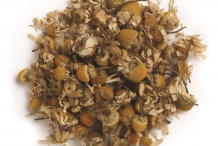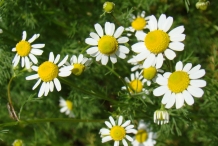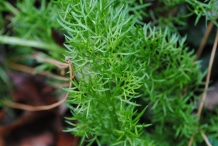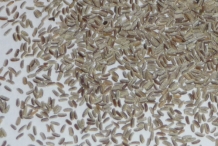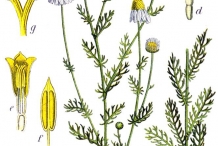Plant
German Chamomile is an erect, ascending or glabrous herb that measures about 20-40 cm high. It has got glabrous and erect stem that bears fragrant, showy flowers that are white with yellow center. The flower head measures about 3/4 inch broad. Leaves are oblong with narrow thorny tip, (1.5-) 2.5 – 6 (-7) cm long and 2 cm wide. This plant bears flower during mid-spring.
Health Benefits of German Chamomile
Chamomile is widely known to the Western world, with its two known varieties such as Roman chamomile and German Chamomile. Though they refers different species both are used for treating the same health ailments such as stomach problems, calms frayed nerves, skin problems, muscle spasms and infections. It has been used for thousands of years for medicinal purposes that date back to ancient Egyptians, Greeks and Romans.
- Treatment for insomnia or anxiety
German chamomile is used to provide relief from sleeping problems and anxiety. The clinical trial made on the treatment of anxiety in people shows that the capsules made from German chamomile helps to lower the anxiety symptoms in the people having mild to moderate generalized anxiety disorder. The animal studies shows that the high dose assist sleep whereas low doses is used to provide relief from anxiety.
- Cure for digestive problems
Traditionally, German chamomile is used to cure irritable bowel syndrome, stomach cramps, diarrhea, indigestion, colic and gas. It soothes as well as relaxes contractions of muscles. No human studies have been made for these conditions. The studies shows that the combination of peppermint, iberis and chamomile is used to provide relief from indigestion symptoms.
- Mouth sores
German chamomile is used to treat mouth problems but no evidence has been provided. It is used as a mouthwash for the prevention of mouth sores.
- Useful for eczema
German chamomile is used in ointment or cream for soothing irritated skin but no studies have been made with people. The studies have shown that the Chamomile cream provides relief from eczema symptoms.
Traditional uses
- It is sedative, carminative and tonic.
- Make the infusion of 1 pint of boiling water and ½ oz. of dried flower for treating ailments in children.
- It could be used as a tonic for gastrointestinal canal.
- It is also useful for the conditions such as earache, stomach disorders, neuralgic pain and infantile convulsions.
- Use it externally fomentation.
- It is used in Folk medicine to treat flatulence and diarrhea.
- It is also used externally for hemorrhoids, furuncles, acne and abscesses.
- It is used for the cramps in gastrointestinal tract, inflammation of upper respiratory tract, teething symptoms and dysmenorrhea.
- Since 1st century AD, it is used to treat digestive problems.
- It is a treatment for hiatus hernia or peptic ulcer.
- German chamomile is used as a remedy for asthma and hay fever.
- As it possess anti-allergic properties, it helps to treat allergies in the body.
- It is also applied to the sore as well as itchy skin or eczema.
Precautions
- One might experience allergic reactions such as tightness in throat, tongue thickening, swelling of eyes, throat or lips.
- The people who are allergic to ragwort or ragweed or sensitivity to Asteraceae or Compositae family such as feverfew, milk thistle and Echinacea should avoid it as soon as possible.
- Pregnant and breast feeding women should avoid its excessive use.
- Allergic people should avoid it.
How to Eat
- The fresh flowers are used to make herbal tea.
- It is used to add flavor to the alcoholic beverages (Benedictine and vermouth), confectionery, ice cream, candy, desserts, baked goods, and chewing gum.
References:
http://www.floracatalana.net/matricaria-recutita-l-
http://www.botanical.com/botanical/mgmh/c/chammo49.html#ger
https://www.itis.gov/servlet/SingleRpt/SingleRpt?search_topic=TSN&search_value=780435#null
http://davesgarden.com/guides/pf/go/291/
http://www.pfaf.org/user/Plant.aspx?LatinName=Matricaria+recutita
http://www.missouribotanicalgarden.org/PlantFinder/PlantFinderDetails.aspx?taxonid=277347&isprofile=0&
http://www.theplantlist.org/tpl/record/gcc-103038
http://www.gardenguides.com/526-chamomile-culinary-herbs-short-season-gardeners.html
http://www.herbs2000.com/herbs/herbs_chamomile_ger.htm
http://www.umm.edu/health/medical/altmed/herb/german-chamomile
Comments
| German Chamomile Quick Facts | |
|---|---|
| Name: | German Chamomile |
| Scientific Name: | Matricaria recutita |
| Origin | Native to Europe and Northwest Asia and got naturalized in North America. |
| Taste | Bitter |
| Name | German Chamomile |
|---|---|
| Scientific Name | Matricaria recutita |
| Native | German Chamomile is native to Europe and Northwest Asia and got naturalized in North America. |
| Common/English Name | Wild Chamomile, False chamomile, German Mayweed, Sweet Feverfew, True chamomile, Sweet false chamomile, Chamomile Flowers, Standardized Chamomile Extract, Kid Chamomile, Pin Heads, Chamomilla, Chamomile, Hungarian Chamomile, Single Chamomile |
| Name in Other Languages | Catalan: Camamilla, Majola, Camamil·la, Maçanella, Matricària; Occitan: Bolièg, Camamilha, Bolèg, Èrba a l’uelh, Camomilh; Danish: Vellugtende kamille; Dutch: Echte kamille; English: Blue chamomile, German chamomile, Chamomile, Hungarian chamomile, White chamomile, Scented chamomile, Wild chamomile; Finnish: Kamomillasaunio; French: Camomille commune , Camomille vraie, Camomille d’Allemagne, Matricaire tronquée, Matricaire fausse camomille; German: Echte Kamille; Hindi: Babuna; Italian: Amareggiola, Camomilla vulgare, Camomilla commune; Norwegian: Ettårig kamille, Kamomilleblom, Kamille; Persian: Babunaj, Babune; Polish: Rumianek pospolity, Rumianek bezpromieniowy; Portuguese: Camomila, Mançanilha, Camomila da alemanha, Margaça-das-boticas, Manzanella; Russian: Romashka aptechnaia (Ромашка аптечная); Sanskrit: Babunaj, Babuna; Spanish: Camomilla, Manzanilla alemana, Manzanilla, Manzanilla cimarrona, Manzanilla común, Manzanilla dulce, Manzanilla de Aragón, Manzanilla matricaria, Manzanilla húngara; Swedish: Äkta Kamomill, Söt kamomill, Blå kamomill, Ungersk kamomilll, Tysk kamomill; Urdu: Babuna; Vietnamese: Dương cam cúc; Afrikaans: Egte kamille; Chinese: Mǔ jú (母菊); Finnish: kamomillasaunio; Latin: Anthodium Chamomillae, Flores Chamomillae; |
| Plant Growth Habit | Erect or ascending, glabrous |
| Plant Size | 20 to 40 cm high |
| Stem | Erect, glabrous |
| Leaf | Oblong, Length: (1.5-) 2.5 – 6 (-7) cm, Wide: 2 cm, narrow thorny tip |
| Flowering Season | Mid Spring |
| Flower | Flower head: 3/4 inch broad, strap shaped, white with yellow center, fragrant, showy |
| Taste | Bitter |
| Plants parts used | Flowers |



